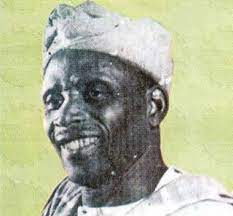Michael Athokhamien Omnibus Imoudu, generally known as Pa Imoudu, was a labour union leader and activist. He encouraged workers in both the private and public sectors to form unions. During the colonial era, he used strike actions to seek better working conditions for Nigerian workers, as well as make the British change obnoxious laws that affected workers.
He later joined the National Council of Nigeria and the Cameroons (NCNC) and was one of the party’s delegates to London in protest of the 1946 Richards Constitution.
Born September 7, 1902, in Ukpafikan Quarters, Oke Ora near Sabongida Ora in Edo State, Imoudu attended Government School, Ora. At the death of his father, he accompanied his uncle to Sapele, later to Onitsha and finally to Agbor, where he completed his primary school education.
After his primary education, Imoudu moved to Lagos and worked with the Posts and Telegraphs Department as a linesman before moving to the Nigeria Railways.
While with the Railways, Imoudu became actively involved in the Railway Workers Union (RWU) and in 1939; he became president of the union. In the same year, the union was registered under the Trade Union Ordinance, which allowed it to seek collective bargaining with their employers. With Imoudu as head, the union renewed its demand for higher wages, de-casualization and improved working conditions.
Imoudu had constant clashes with European managers because of the preferential treatment given to European officials. Between 1941 and 1943, Imoudu was queried many times and dismissed in January 1943.
With the formation of the African Civil Servants Technical Workers Union in 1941 and Imoudu being the Vice President, he used the organisation to agitate for war bonus — Cost Of Living Allowance (COLA) — to cushion the effects of inflation caused by World War II (WW II). The government listened and made some COLA concession in 1942 under the leadership of Bernard Bourdillon.
In 1943, Imoudu was dismissed and detained, but his detention was later changed to restriction of movement. He was released on May 20, 1945, after the end of WW II.
Imoudu was released from prison by the government in 1945, presumably as a means to de-escalate labor tensions. A large rally was held to welcome him back to Lagos, however, and, on the 21st and 22nd of June 1945, Imoudu led a radical wing of the RWU to organize a general strike that became a historically important in Nigeria.
In 1946, Imoudu identified with NCNC and was nominated to its executive council.
From 1947 to 1958, he led different trade unions, including the All Nigeria Trade Union Federation, which enjoyed initial success, incorporating 45 out of the 57 registered unions at the time.
Pa Imoudu did all this with no intention of enriching himself, but to improve the nation and create a better working environment for workers. He could not even build a house or buy a car for himself, despite his dealings with the government and captains of industry. He was focused on making Nigeria a better country than milking the people.
During the Second Republic, he joined the People’s Redemption Party (PRP) as its deputy National President.
In pursuit of his welfare ideologies, he awarded scholarships to youths from different backgrounds to study in the USSR, China, and East Germany.
In 1982, however, the late Chief Obafemi Awolowo built a house and bought a car for him as gifts for his 80th birthday, while a labour institute, Michael Imoudu National Institute for Labour Studies (MINILS), was established and named after him in 1986. He died on June 22, 2005.
Megathreads and spaces to hang out:
- ❤️ Come listen to music and Watch movies with your fellow Hexbears nerd, in Cy.tube
- 💖 Come talk in the New Weekly Queer thread
- 💛 Read and talk about a current topics in the News Megathread
- ⭐️ August Movie Nominations ⭐️
reminders:
- 💚 You nerds can join specific comms to see posts about all sorts of topics
- 💙 Hexbear’s algorithm prioritizes comments over upbears
- 💜 Sorting by new you nerd
- 🌈 If you ever want to make your own megathread, you can reserve a spot here nerd
- 🐶 Join the unofficial Hexbear-adjacent Mastodon instance toots.matapacos.dog
Links To Resources (Aid and Theory):
Aid:
Theory:
now all fediverse discussion will be considered a current struggle session discussion and all comment about it are subject to be removed and even banning from the comm.
have all of you a good day/night 

You know how in YouTube video essays sometimes they'll have an intro where they make coffee and it hard cuts from like pressing the button to the coffee pouring to them taking a sip and going "ahh". Very stylish. I want to do that except it's me taking a shit. Closeup to me unzipping my pants. Hard cut to my ankles as my pants go down. Another hard cut to farting sounds. Hard cut to toilet paper being slowly ripped, very asmr. I think that'd really heighten any three hour long video essays I might like to produce on the politics of Roblox or why the OG Xbox live logo makes me sad.
LMAO
yasss 👏